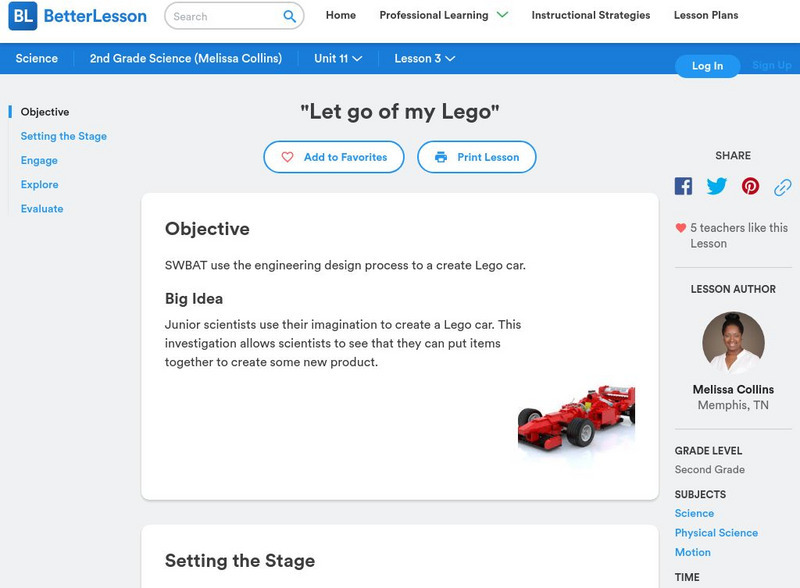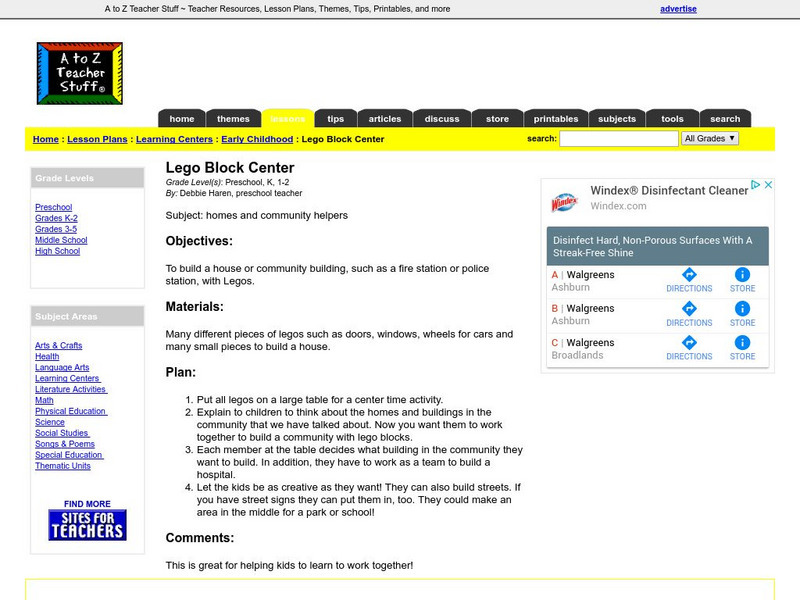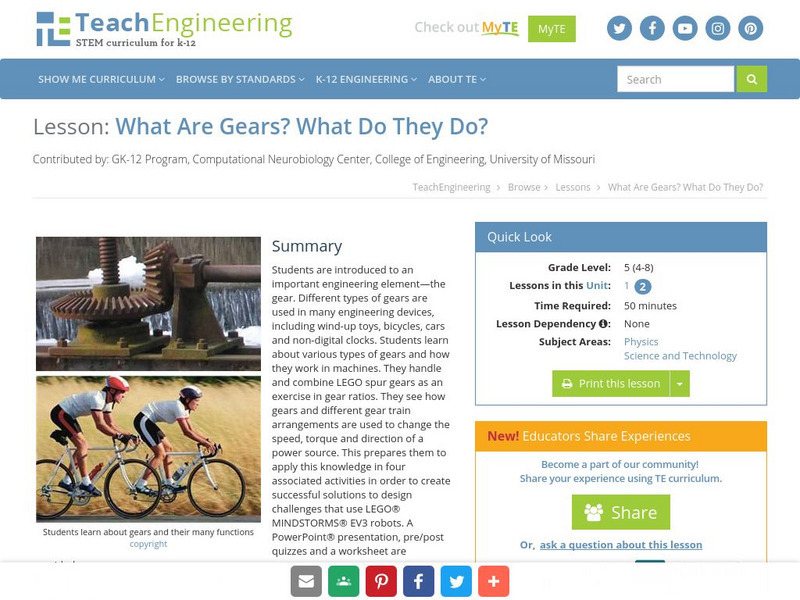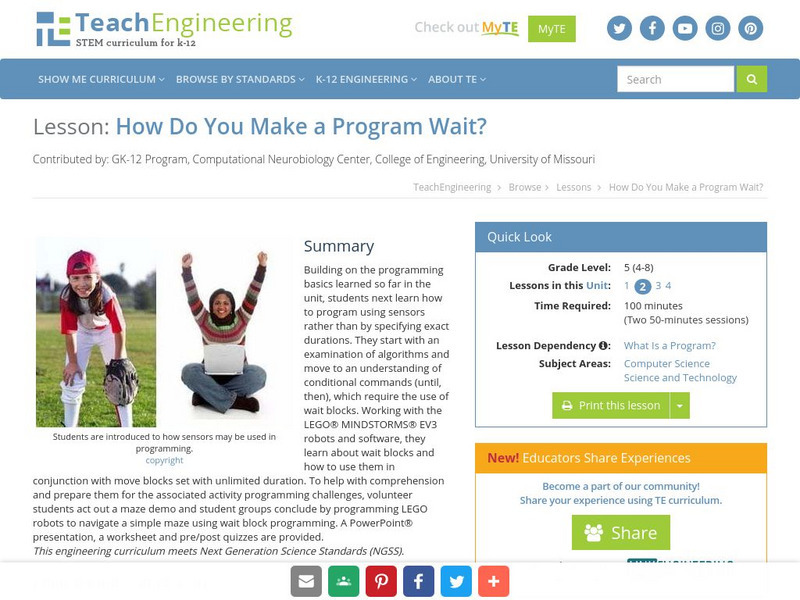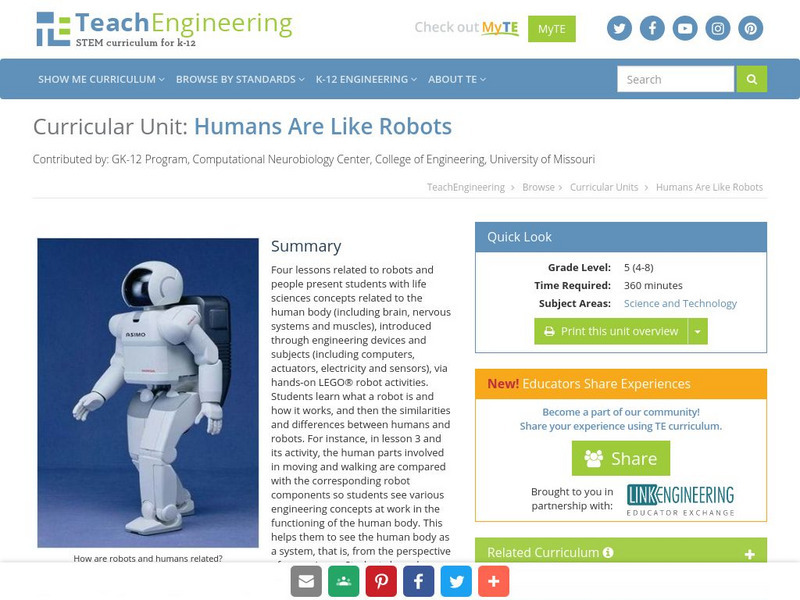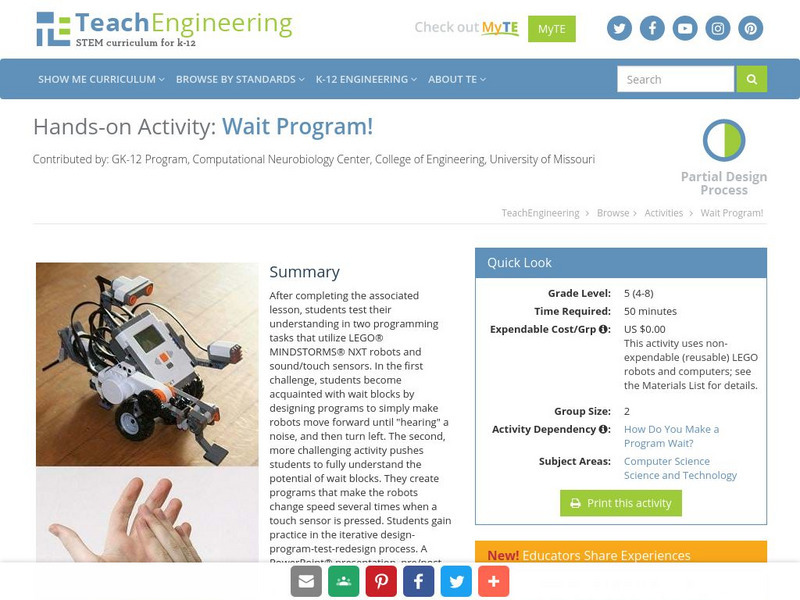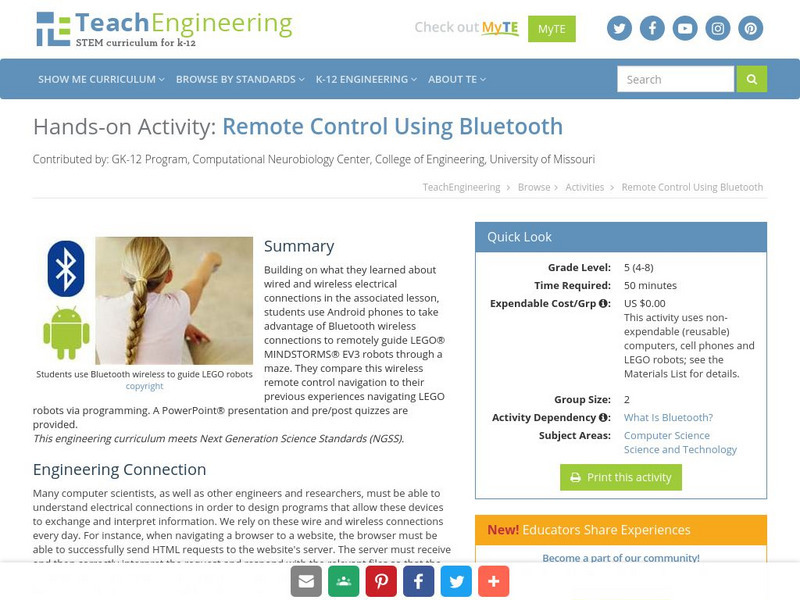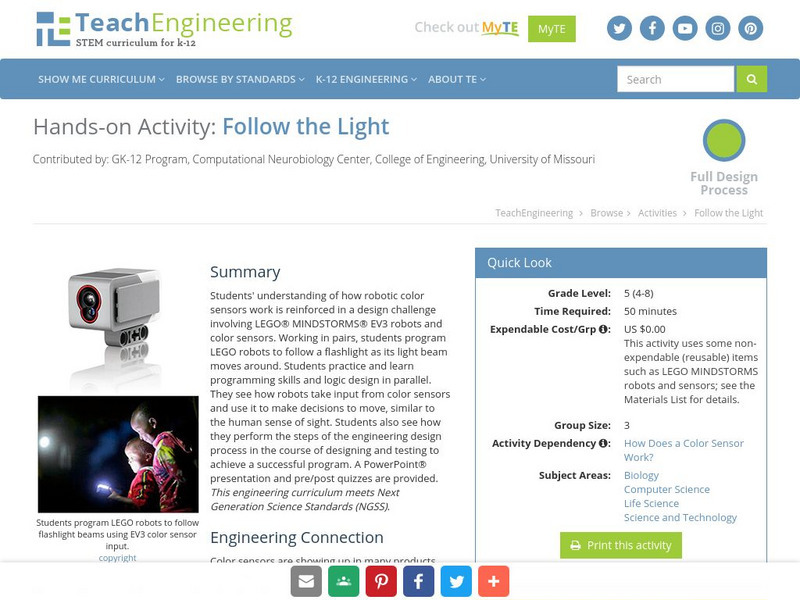Hi, what do you want to do?
Better Lesson
Better Lesson: Area and Perimeter Review Using Legos
Lesson plan in which learners calculate area, build areas to a given amount, and calculate the perimeter with the use of Legos. Step by step instructions and videos are provided. CCSS.Math.Content.3.MD.C.7.c Use area models to represent...
Better Lesson
Better Lesson: "Let Go of My Lego"
Junior scientists use their imagination to create a Lego car. This investigation allows scientists to see that they can put items together to create some new product. Videos of the instructional activity in action and examples of...
PBS
Pbs Learning Media: Environmental Public Health: Understanding Air: Air Pollution & Modeling Pollutants With Lego Bricks
In this lesson, students learn about the chemical reactions that release various pollutants into the atmosphere and what happens when pollutants in the air are exposed to sunlight. They model incomplete combustion using LEGO bricks, and...
A to Z Teacher Stuff
A to Z Teacher Stuff: Lego Block Center (Activity)
This lesson assists in developing teamwork in kindergarten age children and encourages them to take a look at their local community and its institutions.
TeachEngineering
Teach Engineering: What Is a Robot?
This instructional activity introduces students to the major characteristics of robots. The associated activity uses the LEGO MINDSTORMS NXT system as an example. Before studying robots in more detail, it is important for students to...
TeachEngineering
Teach Engineering: How Does a Robot Work?
This instructional activity introduces electricity, batteries and motors using a LEGO MINDSTORMS NXT robot. The associated activity guides students to build a simple LEGO NXT set-up and see the practical implementation of the concepts...
TeachEngineering
Teach Engineering: How Does a Touch Sensor Work?
Students look at human senses and their electronic imitators, with special focus on the skin and touch sensors. They have a chance to handle and get familiar with the LEGO touch sensor, including programming LEGO MINDSTORMS NXT robots to...
TeachEngineering
Teach Engineering: What Are Gears? What Do They Do?
Students are introduced to an important engineering element- the gear. This prepares them to apply this knowledge in four associated activities in order to create successful solutions to design challenges that use LEGO MINDSTORMS NXT...
TeachEngineering
Teach Engineering: What Is a Program?
Using a few blindfolds and a simple taped floor maze exercise, students come to understand that computers rely completely upon instructions given in programs and thus programs must be comprehensive and thorough. Then students learn to...
TeachEngineering
Teach Engineering: How Do You Make a Program Wait?
Building on the programming basics learned so far in a corresponding Robotics unit, learners learn how to program using sensors rather than by specifying exact durations. Working with the LEGO MINDSTORMS NXT robots and software, they...
TeachEngineering
Teach Engineering: How Do You Make Loops and Switches?
Students learn how to program using loops and switches. Using the LEGO MINDSTORMS NXT robots, sensors and software, student pairs perform three mini programming activities using loops and switches individually, and then combined.
TeachEngineering
Teach Engineering: What Is Bluetooth?
Students learn about electrical connections, how they work, and their pervasiveness in our world. Two specific skills explored are Morse code and the function of Bluetooth. Using bluetooth, they control LEGO robots remotely from Android...
TeachEngineering
Teach Engineering: Human and Robot Sensors
Students are provided with a rigorous background in human "sensors" (including information on the main five senses, sensor anatomies, and nervous system process) and their engineering equivalents, setting the stage for three associated...
TeachEngineering
Teach Engineering: What Is a Motor? How Does a Rotation Sensor Work?
Students learn about electric motors and rotational sensors. They create a basic program using the LEGO MINDSTORMS NXT interface to control a motor to move a small robot.
TeachEngineering
Teach Engineering: How Does a Light Sensor Work?
A mini-activity, which uses LEGO MINDSTORMS NXT intelligent bricks and light sensors gives students a chance to investigate how light sensors function in preparation for the associated activity involving the light sensors and taskbots.
TeachEngineering
Teach Engineering: How Do Human Sensors Work?
This lesson highlights the similarities between human sensors and their engineering counterparts. Taking this approach enables students to view the human body as a system, that is, from the perspective of an engineer. Humans have...
TeachEngineering
Teach Engineering: How Does a Sound Sensor Work?
Young scholars learn about how sound sensors work, reinforcing their similarities to the human sense of hearing. This lesson and its associated activity enable students to appreciate how robots can take sensor input and use it to make...
Better Lesson
Better Lesson: Building Tens at the Lego Factory
SWBAT create a number using groups of tens and extra ones.
TeachEngineering
Teach Engineering: Humans Are Like Robots
Four lessons related to robots and people present students with life sciences concepts related to the human body (including brain, nervous systems and muscles), introduced through engineering devices and subjects (including computers,...
TeachEngineering
Teach Engineering: Wait Program!
After completing an associated lesson, students test their understanding in two programming tasks that utilize LEGO MINDSTORMS NXT robots and sound/touch sensors. Students gain practice in the iterative design-program-test-redesign process.
TeachEngineering
Teach Engineering: Remote Control Using Bluetooth
Building on what they learned about wired and wireless electrical connections in the associated lesson, students use Android phones to take advantage of Bluetooth wireless connections to remotely guide LEGO MINDSTORMS NXT robots through...
TeachEngineering
Teach Engineering: Follow the Light
A lesson involving LEGO MINDSTORMS NXT robots and light sensors, student pairs program the robots to follow a flashlight as its light beam moves around.
TeachEngineering
Teach Engineering: Robot Design Challenges
Through the two lessons and five activities in this unit, students' knowledge of sensors and motors is integrated with programming logic as they perform complex tasks using LEGO MINDSTORMS NXT robots and software.
TeachEngineering
Teach Engineering: What Is a Computer Program?
Through four lesson and four activities, students are introduced to the logic behind programming using LEGO MINDSTORMS NXT robots.






